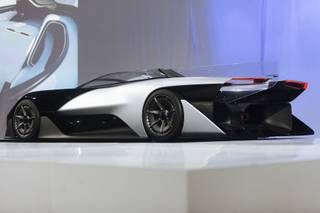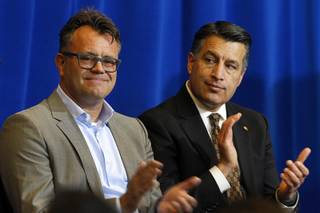As Faraday Future prepares to break ground on its $1 billion auto manufacturing plant in North Las Vegas, there’s a lot that isn’t known about the company.
But there is one thing Faraday has disclosed: One of its key personal backers is Jia Yueting, who leads LeTV, a Chinese media conglomerate. And the companies appear to be tied in other ways. As the Sun reported in September, a filing with the Secretary of State’s Office in California lists Faraday’s CEO as Chaoying Deng, the corporate director of LeTV’s film division. Last year, TechCruch obtained a 2014 market report showing LeTV ENV Inc. as the buyer of a 124,000-square-foot office in Greater Los Angeles that Faraday now uses as its headquarters.
While making its first appearance at CES earlier this month, LeTV disclosed information that sheds light on its goals in the U.S., its structure and its interest in automobiles this year. Given the relationship between LeTV and Faraday, those details could have implications for Faraday.
What’s known about LeTV and its plans for the car business? Here are three takeaways from LeTV’s first CES:
Presence in the U.S. market
LeTV, which is short for Leshi Internet Information & Technology, announced its entry into the U.S. market in April last year. The company said it would set up a shop in Silicon Valley and that it had opened another office in Los Angeles. It called the two regions, along with Beijing, “the connective threads among the global centers of applications, innovation and entertainment.”
"We believe that our open, vertically integrated ecosystem is the future of Internet experiences in the connected age and a stark contrast from closed systems that limit consumer choices and industry innovation,” Jia said in a news release at the time, noting that the company aims to deliver content “across every screen: mobile, tablet, computer, cinema, TV and, soon, electric cars."
Jia has often spoken critically of Apple, but as the Wall Street Journal reported, has also tried to emulate the company and its founder Steve Jobs. The company, in a poster last year for its new smartphone, likened Apple to a Nazi, making the case that its operating system — which isn’t as easily customizable as some other systems — stifles innovation.
In addition to creating its own content, LeTV said it planned to partner with U.S. groups. And at the second day of CES, a spokesperson for the company touted the announcement of a partnership with Major League Baseball the previous day. LeTV’s sports division, known as Le Sports, now has a three-year deal to stream 125 MLB games in mainland China, Hong Kong and Macau. The division also has partnerships with the Association of Tennis Professionals and NCAA’s Pac-12 Conference.
The most tangible evidence of LeTV’s presence in the U.S. has been the fall launch of its online store, LeMall.com. The store sells a high-resolution slim TV, on display at LeTV’s CES booth, speakers and headphones. LeTV has initially said it would cater its U.S. line to Chinese-speaking Americans, taking advantage of a library of 100,000 television episodes and 5,000 movies.
More than the “Netflix of China”
LeTV in the media is often referred to as the “Netflix of China.” If anything, that description is an understatement. LeTV does far more and wants to be known for more than content creation.
At CES, it showed off a connected smart bicycle and a connected Aston Martin (not directly related to Faraday Future). It has launched a line of smartphones in China — it calls them Le Superphones — and offers a cloud service to connect its offerings. It even boasts an incubator program, whereby the company invests in products and services that align with its mission.
But it is also true that a large part of LeTV’s business model revolves around content.
In addition to providing content through partnerships, LeTV produces its own content. Its film division, Le Vision Pictures, has headquarters in Los Angeles and in Beijing. The division distributed sequels of “The Expendables” in China and is an investor in “The Great Wall,” a production from Legendary Entertainment China and Universal Pictures that stars Matt Damon.
Interested in the car business
And then there is the company’s fascination with cars.
If there was any centerpiece at its CES booth, it was a royal blue Aston Martin meant to display LeTV’s Super Electric Ecosystem, which is the expertise and technical knowledge it says its lending Faraday with their strategic partnership.
With the ecosystem, LeTV, like Faraday, seeks to redefine mobility. It said in a December 2014 news release that its in-car operating system “could achieve unmanned driving, automatic parking, smart navigating, precise positioning and searching functions based on personal interests.”
The cars LeTV envisions would have integrated tablets and touch screens. In lieu of a physical control panel, the Aston Martin — LeTV has a Memorandum of Understanding with the car company — had a tablet display embedded into the front of the car, similar to Tesla’s Model S.
The difference is the company also would distribute the content streamed onto the screen.
Like Faraday, LeTV has wanted to create a car, and has hinted at pursuing a project on a similar timeline. In December 2014, Jia announced his intentions to enter the electric car market. Since Faraday executives say the company has been around for 18 months, Faraday would have already been in existence at the time of Jia’s foray into the car industry.
Shortly after Jia’s announcement, LeTV announced that it had created a subsidiary known as Leshi Super Electric Car Company with a Silicon Valley-based research team and 260 employees, Forbes reported in January 2015. During CES, a spokesperson at the Faraday booth said that the Leshi Super Electric Car Company operates on its own.
LeTV’s interest in automobiles continued signing several partnerships in the Fall. The company recently purchased a 70 percent stake in a Chinese ride-hailing company, Yidao Yongche and invested in Dianzhuang Technology Co., which does work in electric vehicle charging.
Meanwhile, Faraday is planning to start work on its factory by the end of the month. Last Friday, a state board gave its final approval to tax incentives for Faraday, which predicts its factory here will produce 150,000 cars on an annual basis.


